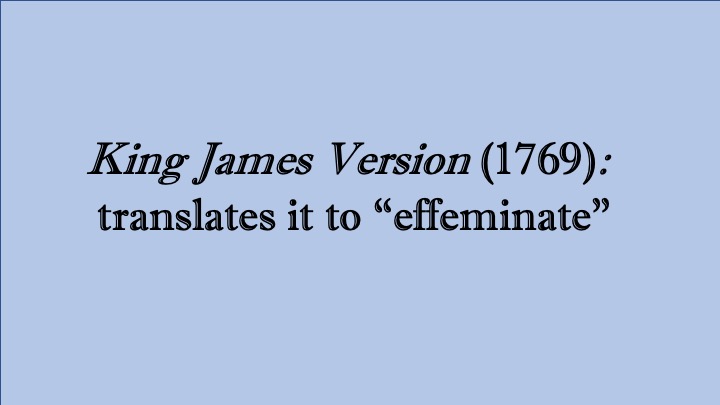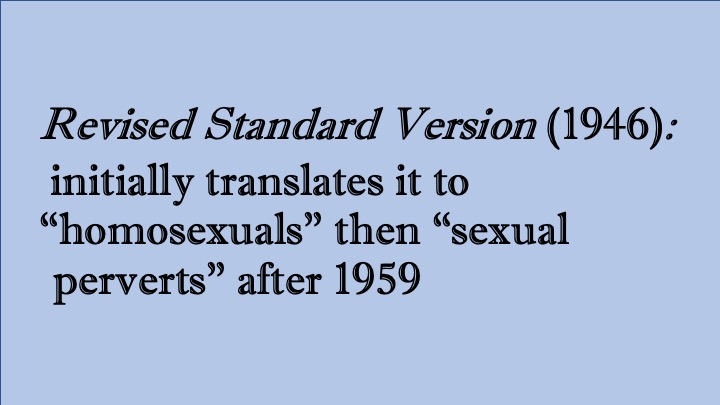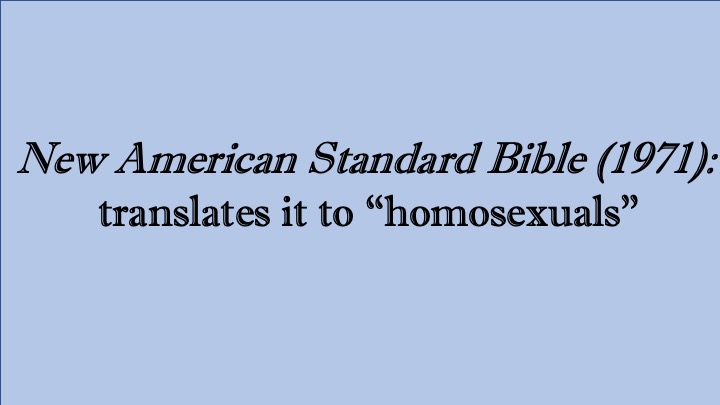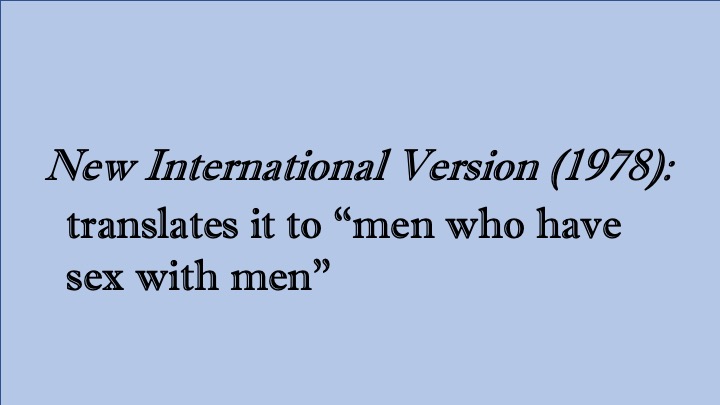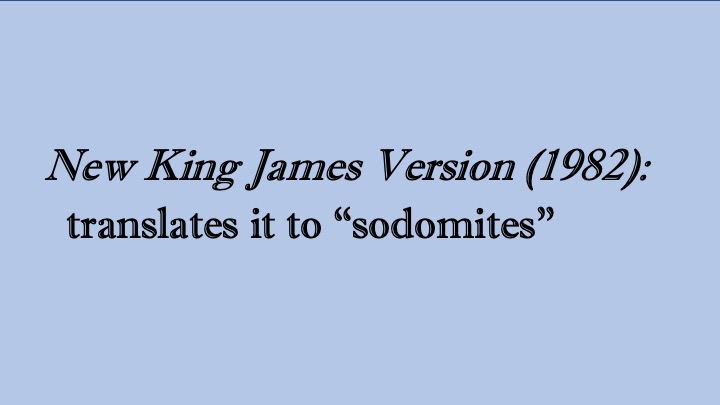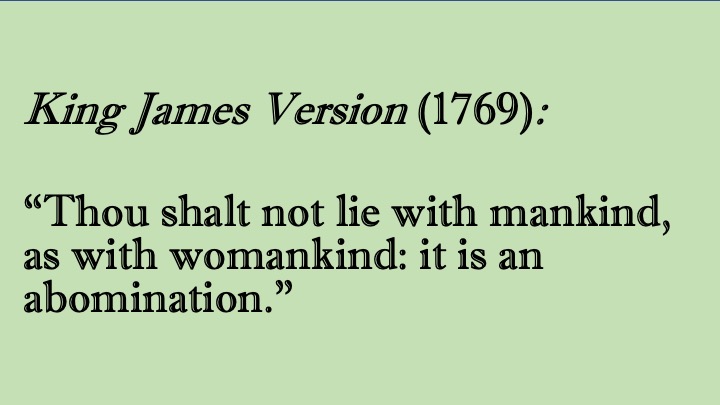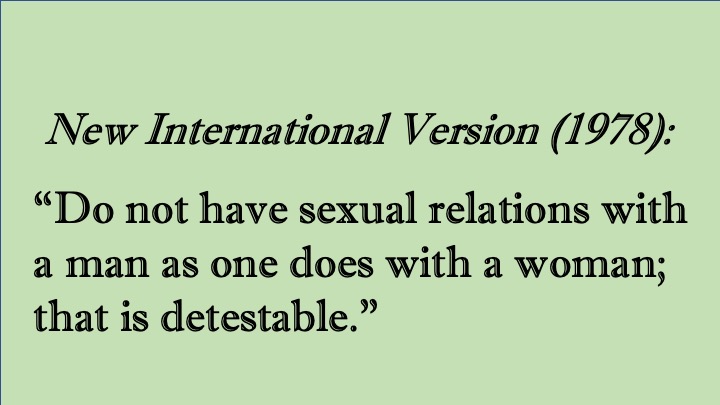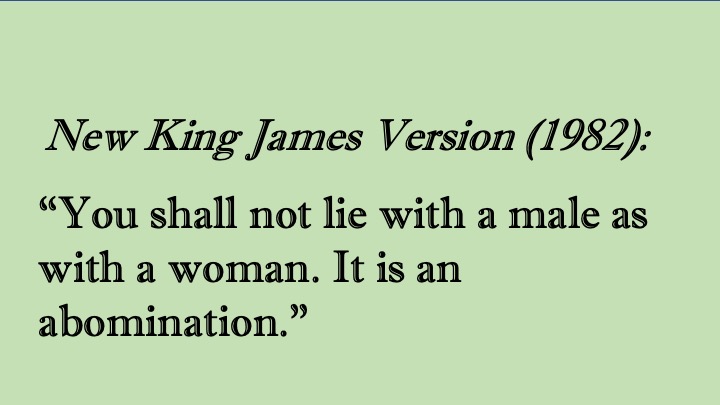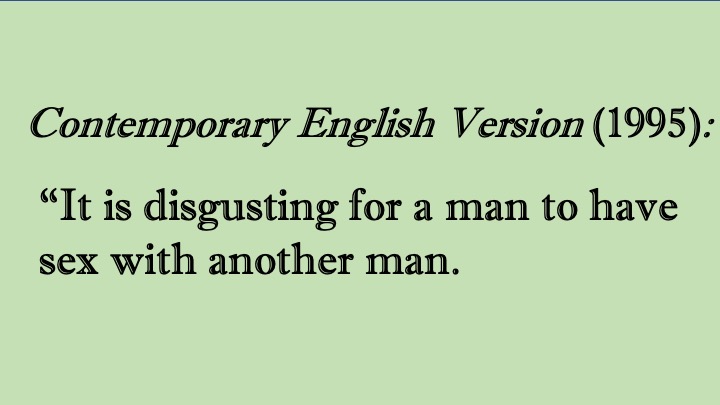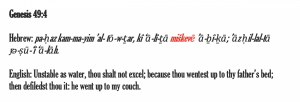The rise of the gay pride and gay liberation movement that started in the 1970s in America was followed by a growing social conservatism in the 1980s and 1990s, as many conservatives felt the country was being led to moral degradation. That same conflict between social liberals and social conservatives has continued into present day, and Christianity has become an important feature of the conversation around LGBTQ+ rights.
 Pro-LGBT interpretations argue that homosexuality, as a defining aspect of a person’s identity, is a new construct that the Bible couldn’t have passed judgment on. In that time, there was no concept of being “born this way,” so homosexuality was seen as a perverse impulse to which some gave in.
Pro-LGBT interpretations argue that homosexuality, as a defining aspect of a person’s identity, is a new construct that the Bible couldn’t have passed judgment on. In that time, there was no concept of being “born this way,” so homosexuality was seen as a perverse impulse to which some gave in.

Others draw attention to the “clobber passages,” passages in Scripture that directly address the subject of homosexuality (Leviticus 18:22, Romans 1:26–27, and 1 Corinthians 6:9–10). Many Christians use these verses as support for arguments against the right to same-sex marriage or even as a justification for discrimination against LGBTQ+ persons on religious grounds. There is uncertainty, however, surrounding some of these verses and whether it not they really condemn homosexuals as strongly as some claim.
1 Corinthians 6:9-10
 1 Corinthians 6:9-10 are one of the most commonly used verses by Christians establish heterosexuality as the norm and to condemn any non-heteronormative sexuality. Corinthians is a book from the New Testament, which was originally written in Koine Greek. Koine Greek served as the lingua franca in the Middle East and Mediterranean after Alexander the Great’s conquests. These verses state that no arsenokoites will inherit God’s kingdom, and many interpret this term to mean homosexuals, but the meaning is ambiguous.
1 Corinthians 6:9-10 are one of the most commonly used verses by Christians establish heterosexuality as the norm and to condemn any non-heteronormative sexuality. Corinthians is a book from the New Testament, which was originally written in Koine Greek. Koine Greek served as the lingua franca in the Middle East and Mediterranean after Alexander the Great’s conquests. These verses state that no arsenokoites will inherit God’s kingdom, and many interpret this term to mean homosexuals, but the meaning is ambiguous.
Across English translations of the Bible, we see there is lot of ambiguity around arsenokoites.

As we can see homosexual doesn’t appear in this verse in the 1946 Revised Standard Version (RSV) version. The novelty of this translation went largely unnoticed until 1959, when a young, gay seminary student named David wrote a letter to Luther Weigle, head of the RSV biblical translation committee and dean of Yale Divinity School. David challenged the introduction of the word “homosexual” in the Bible, such as in 1 Corinthians 6:9, by highlighting the same concerns noted above. Weigle wrote back admitting that the RSV translation was an error and recognizing that “sexual perverts” was a more accurate expression than “homosexuals.” It was too late, however, and many latter versions of the Bible such as, The New American Standard Version, The New International Version, and the New King James Version followed the example of the original RSV and translated it as homosexuals.
Leviticus 18:22
Most traditional Christians interpret Leviticus 18:22 as a divine condemnation of erotic, same-sex relationships between males, but many downplay the ambiguity of the text.
Across translations, there are slight variations for this verse.
Is there a distinction between “lie with” and “have sexual relations with?” “Lie with” could imply some romantic quality to the relationship, whereas “have sexual relations” seems much more impersonal. Does God see it as “an abomination” and just as “disgusting?” “Abomination” conveys a much stronger condemnation of the act than “disgusting” does, so if God is only displeased by the act, it undermines the argument against homosexuality.
Furthermore, the word miškevē (in red) is a rare biblical word that only occurs one time in the entire Bible besides occurrence in Leviticus. In Genesis 35:22, Reuben, the first-born son of Jacob, has sex with Jacob’s concubine Bilhah. Later, in Genesis 49:4, Jacob removes Reuben from his extra inheritance as firstborn and uses miškevē to describe his act of bedding Bilhah.
Thus, some scholars believe that miškevē may convey a much stronger word, “rape,” instead of just “lie with.” Therefore, the likely meaning of miškevē ‘iššâ refers more to male-male rape as opposed to all erotic, same-sex relationships.
We can see a discrepancy in translating Leviticus 18:22 across other languages as well. In this picture depicting Martin Luther’s original German translation of the Bible from 1534, these verses use the word “Knabenschander.” In German, knaben means boy and schander means molester, which implies that knabenschander translates to a male pedophile, not a homosexual.

This would mean that the Bible was not in fact condemning homosexuality and would undermine the beliefs of many who cite these verses as “proof” of it being a sin. In fact, the word homosexual was coined in German in 1869 but doesn’t appear in a German Bible until 1983, in a NIV version that was paid for by an American company Biblica. This shows how one one mistranslation can lead to the perpetuation of misinformation even across country lines.
Romans 1:26-27
In Romans 1:26-27, Paul claims that, as punishment for nonbelievers for not honoring and giving thanks to Him, God gives them up to the “degrading passions” and “impurity” that lie in their hearts, resulting in exchanging “natural intercourse for unnatural” with men being consumed with passion for other men instead of women. Paul makes a distinction between “sinful” and “unnatural” and presents homosexual sex more as “unnatural” rather than “sinful.”
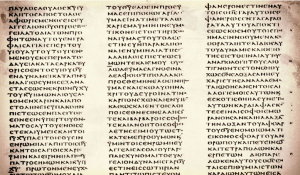
Para physin are the Greek words used to describe this homosexual sex as “contrary to nature.” In Romans 11:24, Paul also describes the activity of God in saving the Gentiles as para physin. God saving the Gentiles is seen as “unnatural” because they have no inclination or tendency toward pleasing God. In the same way, homosexuality was seen as an all-consuming impulse that distracted people from God. The service of God should be above all in His eyes, so his displeasure with homosexuality could be a result of lessened worship, not because of the actual act. Thus, this passage could be seen as not an indictment of homosexual sex specifically, but just as a general admonishment towards placing carnal desires above God.

